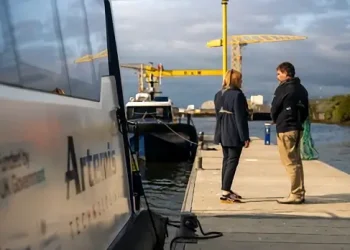The shipbuilding industry received a significant boost as Navantia UK finalized its acquisition of Harland & Wolff shipyards. Secretary of State for Northern Ireland Hilary Benn welcomed the deal, which secures 1,000 jobs across the UK, including 500 in Belfast.
This agreement also supports the Fleet Solid Support Programme, ensuring the construction of three Royal Navy ships.
A Historic Turning Point
Harland & Wolff, renowned for building the Titanic, has been a symbol of British engineering prowess for over a century. This acquisition not only preserves the legacy of one of the UK’s most iconic industrial entities but also paves the way for economic revival in coastal communities.
The Belfast facility, in particular, stands as a beacon of resilience, protecting jobs and promising a brighter future for its skilled workforce.
Hilary Benn expressed her enthusiasm, stating,
“This investment is great news for Belfast, for the Northern Ireland economy, and, above all, for Harland & Wolff’s hugely skilled shipbuilding workforce.”
Economic and National Security Benefits
The deal aligns with the UK Government’s Plan for Change, emphasizing economic growth through skilled and productive jobs. The Fleet Solid Support Programme ensures that the UK maintains its sovereign shipbuilding capabilities while bolstering national security.
This investment reflects a commitment to safeguarding not just jobs but also strategic industrial assets.
Economic Highlights of the Deal:
- Jobs Secured: 1,000 UK jobs, including 500 in Belfast.
- Fleet Solid Support Programme: Delivery of three Royal Navy ships.
- Regional Growth: Strengthening coastal economies across the UK.
Effects |
Detail |
|---|---|
| Jobs Secured | 1,000 total; 500 in Belfast |
| Programme Supported | Fleet Solid Support (Royal Navy) |
| Economic Goals | Skilled jobs, regional development |
Union and Public Reactions
Unions representing Harland & Wolff workers have cautiously welcomed the deal. The GMB and Unite unions acknowledged the agreement as a lifeline for the shipyards but urged for sustained investment in skills and facilities.
Matt Roberts, GMB National Officer, remarked,
“Without a steady drumbeat of work, these yards will continue to struggle.”
The acquisition has also sparked discussions about sovereignty. While the deal ensures the shipyards remain operational, the involvement of Navantia—a Spanish state-owned company—has raised questions about the future of British industrial autonomy.
Challenges and Opportunities
Despite the positive outcomes, several challenges remain. Harland & Wolff’s survival depends on consistent work orders and strategic investments. Furthermore, concerns linger over financial transparency and long-term sustainability.
Yet, the collaboration between Navantia UK and Harland & Wolff offers opportunities for technological innovation and cross-border partnerships.
What’s Next for Harland & Wolff?
- Engagement with unions to address worker concerns.
- Investment in modernizing facilities.
- Expansion of shipbuilding contracts to ensure steady growth.
Preserving Heritage, Building the Future
This agreement marks a pivotal moment in British shipbuilding history. By saving Harland & Wolff, the UK has not only preserved a cornerstone of its industrial heritage but also charted a course toward a more prosperous and secure future.
As the shipyards transition under Navantia’s leadership, all eyes will be on Belfast and its workforce, whose expertise continues to shape the nation’s maritime legacy.
Sources: THX News, Northern Ireland Office, Financial Times, Unite the Union, Proactive, RTE, The Maritime Executive & The Rt Hon Hilary Benn MP.









